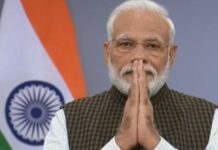
At the Chintan Shivir in Udaipur, the Congress approved a slew of changes in the organization. It has decided to have 50 percent of all office bearers under 50 years of age besides expressing its resolve to implement the ‘one family one ticket’ rule. A report by Amit Agnihotri
The Congress has decided to get a new look ahead of the 2024 Lok Sabha elections when it hopes to take on the ruling BJP.
To achieve that goal, the party approved a slew of changes in the organization at the Nav Sankalp Shivir held from May 13-15 in Udaipur, Rajasthan.
Now, the Congress will have 50 percent of all office bearers under 50 years of age, implement the ‘one family one ticket’ rule, which however will not apply to the Gandhi family and limit the tenure of office bearers to five years, which again will not apply to the Congress president as the person holding that office has unlimited tenure as per the party constitution.
“We want all committees, including the Congress Working Committee down to the booth-level teams to have half of office bearers under the age of 50 years,” Congress general secretary Ajay Maken said.

The Congress will also set up mandal-level panels, which will bridge the gap between the booth level and block level panels.
“A gap was being felt between block and booth level teams. The mandal level panels can fill this gap. Around 15-20 booths can come under a mandal and 15-20 mandals can come under a block. This will strengthen our party at the ground level,” said Maken.
Noting the systems of the Congress had not changed since the past 50-60 years, Maken said the party will set up an insight group, which will function round the year to assess issues relevant to the people and conduct surveys to get public feedback which is usually done only near the elections.
“New tools of democracy have emerged but we have not been able to make use of them. Due to this sometimes our rivals speed past us and we are left behind. This needs to change,” said Maken.
He also said the party will set up an assessment wing, which will review the performance of party functionaries at regular intervals and make suitable amendments wherever needed.
“Many a times, posts are lying vacant and we are not able to appoint leaders. This should be avoided in future,” said Maken.
Talking about unity, the senior leader said that disciplinary panels needed to be formed at the state and district level to ensure better accountability.
“There should be a system at the state and district level to punish and reward the workers based on what they do. It will discipline the errand workers as well motivate those who toil for the party,” said Maken.
The decisions were taken after Congress chief Sonia Gandhi clearly told the party leaders that it was time for change.
“The people expect the party to be flexible to change. The time for change is now and it will be done. The organisation needs to change in order to be alive and grow. We need to display a spirit of sacrifice and courage,” Sonia said at the Chintan Shivir.
For that, she said, a collective effort was needed.
“We should take a pledge to restore the position of the party in the country,” she said, urging the leaders to stay united and speak in one voice.
Why Chintan Shivir?
The Chintan Shivir was organized in the wake of the party’s defeat in the five assembly polls, UP, Uttarakhand, Punjab, Goa and Manipur in March.
Last year, the party lost polls in Assam, West Bengal, Puducherry and Kerala. In Tamil Nadu it won in alliance with DMK.
The party has suffered several losses since it was defeated in the 2014 and 2019 Lok Sabha elections. It now needs a roadmap for 2024 polls.
Noting she was aware of the “recent poll losses and the struggle required to win” in the future, Sonia said “the party was in the midst of unprecedented circumstances, which needed unprecedented responses.”
She reminded the leaders that it was payback time.
“It is time for us to repay our debt to the party. We have to place personal ambitions below the party’s interests,” said Sonia.
Listing the various challenges being faced by the country, for which she blamed the Modi government, the Congress chief pressed for reforms saying the organisation “needed to change its strategy and the way it conducts routine affairs.”
She also urged the leaders to curb dissent in public. “During the shivir discussions, you can express yourself freely. But ensure that the message of unity that goes out is in one voice,” said Sonia.
The Udaipur shivir came almost a decade after the last such session was held in Jaipur in 2013. Noting that “there are serious threats to the country,” the Congress said the grand old party “liberated the country from British rule and will now play its role.”
Implementing changes
To implement the decisions taken at Udaipur, the Congress has formed a political affairs committee, a task force 2024 and a panel to coordinate the proposed nation-wide yatra.
The AICC in charge will hold state-level shivirs on June 1 and 2 to guide the leaders on how to implement the Nav Sankalp Declaration.
AICC general secretary in charge of Organization KC Venugopal held a meeting of all general secretaries in charge of states and discussed the ways to implement the Declaration, which is expected to bring sweeping changes in the grand old party and prepare it for the 2024 national elections.
“We discussed in detail how to implement the decisions taken at the Chintan Shivir,” AICC in charge of Uttar Pradesh Priyanka Gandhi Vadra tweeted after the meeting.
Later, the state unit chiefs will hold similar shivirs in the states on June 11 to guide the leaders on block-level implementation of the Udaipur declaration.
The “50 percent under 50 years” rule has been approved to give the grand old party a new look and bring it closer to the young voters.
The Congress has also decided to take up the issue of unemployment in a big way and has directed the Youth Congress and the NSUI to take out three-day Azadi Gaurav yatras from August 9 to 15 in all states.
Sources said the directive to hold state-level shivirs to implement the Udaipur declaration has been planned to address the resistance that the change is generating from the seniors who have been working for the past decades.
Many of the veterans are miffed over the decision that half the tickets for the 2024 Lok Sabha polls will only go to those under 50 years of age. This, the veterans, have argued is not beneficial and may create more dissent.
Party insiders said that bringing about changes in an old system is never easy but the process has to be taken forward through consultations.
“We are inviting the youth to join the party and become part of a happening and dynamic organization,” Ajay Maken said.
Congress losing leaders
Even as the Congress was holding its chintan shivir, former Punjab chief Sunil Jakhar announced he was quitting the party and later joined the BJP.
Within a week, the Gujarat working president Hardik Patel also left the Congress, in a setback for the party ahead of the assembly polls later this year.
Jakhar quit the party weeks after he was issued a show cause notice by the leadership over his criticism of former chief minister Charanjit Singh Channi.
In April, the Congress’ disciplinary panel, chaired by senior party leader AK Antony, had recommended that Jakhar be suspended from the party for two years and removed from all posts.
“Goodbye and good luck, Congress,” Jakhar said in a Facebook live video. “The party is facing an existential crisis and we are behaving as if the country’s responsibility is on our shoulders. As they say, there are many ideas to decorate the house, but first decide how to save it.”
“You did not sever ties with me, you broke my heart, you issued a notice, were you all ashamed to talk to me? I would have given all the answers,” he said.
The former Punjab Congress chief had termed Channi a liability for the party after it lost to the Aam Aadmi Party (AAP) in the state.
Jakhar had also been critical of the party leadership for picking Channi as chief ministerial candidate for the elections, and had hit out at senior leader Ambika Soni for supposedly scuttling his chances of being picked as chief minister after Amarinder Singh’s ouster.
Soni had said she turned down an offer for the chief minister’s post and told the leadership that only a Sikh should be chosen for the job. Jakhar was being considered a front runner for the top post and Soni’s remark supposedly ruined his prospects.
Responding to Jakhar’s exit, former Punjab Congress chief Navjot Singh Sidhu said the party should not lose him. “The Congress should not lose #sunilkjakhar …. Is an asset worth his weight in gold …. Any differences can be resolved on the table,” he tweeted.
In Gujarat, Hardik had blamed the indifference of senior state leaders as one of the reasons behind his exit.
Party insiders said though Hardik, who shot into fame after leading the Patel quota movement in 2015 and was later roped in by Rahul Gandhi, had been in contact with the state BJP leaders as he had been miffed over the Congress’ attempts to woo Naresh Patel.
Party insiders claimed that Hardik, who had been made a working president by the high command, had lost much of his influence among the Patels over the past years and was therefore facing criticism from sections of his community who had participated in the quota agitations earlier.
Congress strategists said though the withdrawal of cases against Hardik and his supporters was linked to the young leader’s resignation, his style of functioning had miffed several senior leaders.
Congress and PK
In April, poll manager Prashant Kishor suggested a plan to revive the Congress ahead of the 2024 national polls but later declined an offer from Sonia Gandhi to become part of an empowered action group for the purpose.
Kishor had suggested radical changes in the party, which was not appreciated by the veterans, who were miffed over his views that the Congress should have a tie with TRS in Telangana.
This was against Rahul’s view who has said no to any pact with the TRS.
Recently, a miffed Kishor predicted that the Congress would face defeat in the coming Himachal Pradesh and Gujarat assembly polls but would be known only later this year.
Congress and allies
Rahul Gandhi’s remarks at the shivir that Congress was the only national party that can defeat the BJP ideologically and the regional parties were only based on caste and were not equipped for the challenge that the saffron party presents before the opposition, had upset the allies like RJD in Bihar and JD-S in Karnataka.
RJD MP Manoj Jha said that the regional parties were stronger players when it came to the Lok Sabha elections and the Congress should work like a co-traveller.
RJD, based in Bihar, has been an ally of the Congress since 2004 both in the state and national polls. It was also part of the previous UPA government at the Centre.
In 2019, the two parties contested the national elections jointly but the RJD scored nil while the Congress could get just one seat of Kishanganj out of the 40 Lok Sabha seats in Bihar.
The BJP-JD-U alliance got 39 seats.
Since then. the Congress has been trying to regain lost ground in the eastern state and is in the process of revamping the state unit.
The Congress had also planned a yatra in the name of Mahatma Gandhi starting from Champaran to regroup in the state. However, the event was cancelled at the eleventh hour and former state unit chief MM Jha was asked to resign.
Later, in a course correction, Rahul said that the Congress did not have a big brother attitude but was working together with the other opposition parties to take on the ruling BJP.
“The Congress is not a big daddy but is working together with the other opposition parties. The point that I made in Udaipur was misconstrued. The Congress is the party that has an ideology at the national level. It will enable the opposition. It is not that the Congress is superior to other parties. We are fighting the same battle,” Rahul said at the “Ideas for India” conference in London, which was also attended by RJD leaders Tejaswi Yadav and Manoj Jha, CPI-M leader Sitaram Yechury and TMC leader Mahua Moitra.













